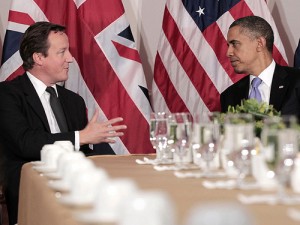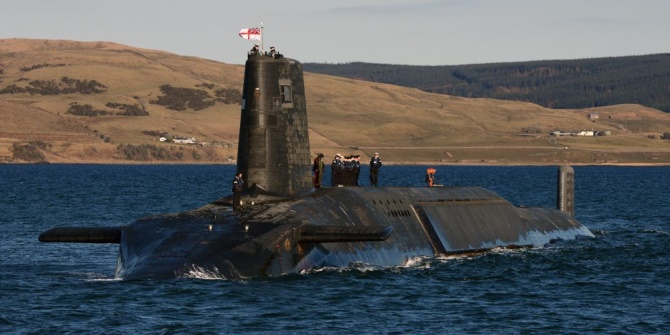 With David Cameron currently in Washington, John Dumbrell reviews the recent history of US-UK relations. The special relationship has clearly not been so stellar in recent times. With American foreign policy pivoting towards the Asia-Pacific region and US irritation with European contributions to NATO, Cameron will need to be very persuasive to resurrect the possibility of London acting as an ‘Atlantic bridge’ to Washington.
With David Cameron currently in Washington, John Dumbrell reviews the recent history of US-UK relations. The special relationship has clearly not been so stellar in recent times. With American foreign policy pivoting towards the Asia-Pacific region and US irritation with European contributions to NATO, Cameron will need to be very persuasive to resurrect the possibility of London acting as an ‘Atlantic bridge’ to Washington.
David Cameron entered Downing Street in 2010 against background of widely expressed anxiety about the future of the US-UK ‘Special Relationship’. President Obama’s relationship with Cameron’s predecessor as prime minister, Gordon Brown, had never approached anything resembling closeness. Obama praised Brown for his leadership during the post-2007 global economic crisis, but had also effectively clashed with London over a series of issues ranging from the BP oil spill to the release of the Lockerbie bomber in early 2009. Other sources of irritation, which lasted beyond the Brown years, included United States attitudes towards negotiations regarding the future of the Falklands Islands, and the case of Gary McKinnon (the British youth, with Asperger’s syndrome, accused of hacking into Pentagon computers and the subject of US-led extradition procedures).

Numerous commentators pointed out before 2010 that president Obama, unlike many former presidents of the United States, had no special or positive emotional ties with the United Kingdom. Indeed, as Obama related in his autobiography, the presidential grandfather had actually been imprisoned and tortured by the British in Kenya. To add to the apparent disarray of US-UK ‘special relations’ as Cameron took office, the Brown-Obama relationship had been distinguished by a series of public relations disasters. Obama apparently commented negatively on Brown’s treatment of prime ministerial aides at the G-20 London summit in April 2009 and it was reported Brown was virtually stalking the US president in New York in September 2009, tracking him down eventually in the kitchen of the United Nations building.
The problems between London and Washington after 2008, of course, need to be understood not only in terms of personalities, but in terms of the backwash to the Blair-Bush partnership in the context of the War and Terror and the 2003 invasion of Iraq. Cameron himself used the occasion of the fourth anniversary of 9/11 to distance his own ‘liberal conservatism’ from American ‘neo-conservatism’ which drew a public rebuke from Lady Thatcher. As shadow Foreign Secretary, William Hague developed the theme of British support for the US being ‘solid not slavish’.
There was indeed quite a lot of rebuilding to do when the new coalition came to power in 2010. Cameron’s task was not helped by Wikileaked revelations to the effect that, even as he pursued his rhetorical ‘solid not slavish’ line, Hague was reassuring Washington that it had no reason to expect anything but enthusiastic pro-Americanism from any incoming Conservative administration.
As the Cameron-Obama relationship developed, reports emerged of strains: notably in connection with American criticism of the British military performance in Iraq and in Afghanistan. With a leftist executive in Washington and a rightist one in London, tension also developed over preferred policies for dealing with recession. Washington (at least before the 2010 mid-term elections) stimulated the economy while London not only cut back aggressively at home, but urged the adoption of contractionist strategies abroad. As the US economy appeared to pick up by the end of 2011, the US approach looked (from the perspective of Downing Street at least) rather embarrassingly superior. Perhaps the major and most obvious ‘special relationship’ tension emerged over Libya in 2010. French and British reactions to the civil uprising in Libya contrasted with the (decidedly post-Iraq) tepid reaction in the White House to the entire Arab Spring.
As often in the history of US-UK relations, a period of difficulty was at least temporarily contained by a display of symbolism. President Obama’s state visit to the UK in May 2011 was a public relations success. Obama’s Westminster Hall address saw the president asserting his adherence to the kind of liberal interventionist (if not downright neo-conservative) values to which his own very pragmatic conduct over Libya had seemed opposed. Obama and Cameron embraced the notion of a US-UK ‘essential relationship’, based on a fusion of interests and values, and deriving from pieces written by Cameron during his July 2010 visit to Washington. At least in rhetorical terms, the two leaders now developed a reasonably persuasive defence of ‘special relations’, devoid of over-sugary sentiment. Obama showed during the state visit that he was prepared to talk the language of ‘special relations’, even if he left audiences in no doubt that the UK was far from the centre of his foreign policy.
To understand the context of current interactions between the two leaders, we need to refer more widely: to contemporary problems in the North Atlantic Treaty Organisation and to a widely perceived crisis in US-European relations. London’s handling of the crisis will determine the future of the ‘special relationship’ – at least if we define that relationship in terms of close diplomatic, intelligence and military cooperation, rather than simply sentiment and historical flummery. But, to put it bluntly, NATO is now in a mess. The problems, at least as seen from Washington, were put with great clarity in the valedictory address delivered by Robert Gates in June 2011. Liberated by his impending retirement, Gates gave full expression to American grievances; against European armies with almost a token, non-fighting presence in Afghanistan; and against NATO partners who cannot even muster two per cent of GPD for defence spending.
The ‘strategic guidance’ issued by the Pentagon in January 2012 left little doubt that the Asia-Pacific, rather than Europe, will be the centre of American strategic attention in the foreseeable future. Chinese, not Russian, power seems to dominate American thinking in a strategic environment of shifting priorities, shrinking commitments, and intense spending pressures. The 2012 Pentagon ‘strategic guidance’ includes plans for $450 billion in defence cuts, a substantial proportion of which is almost bound to come from commitments to Europe.
From Washington’s point of view, London is certainly not the worst European offender in terms of willingness to share burdens in NATO. The UK is also seen as wisely having at least side-stepped the toxic mess of the single European currency. On the other hand, Britain’s semi-detached status in the EU calls into question London’s credibility as a transatlantic partner for the US. Cameron is bound to resurrect the possibility of London acting as an ‘Atlantic bridge’ to Washington. He will need to be very persuasive.
Please read our comments policy before posting.
John Dumbrell is Professor of Government at Durham University. He is the author of A Special Relationship: Anglo-American Relations from the Cold War to Iraq (2006). His forthcoming book is entitled Rethinking the Vietnam War and is due to be published by Palgrave/Macmillan in July, 2012.






